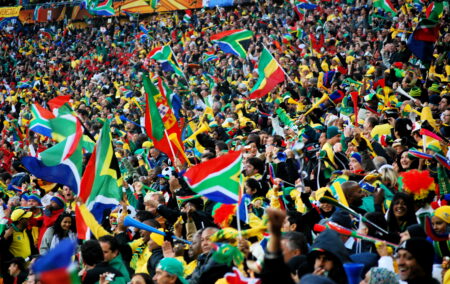This past weekend was one of those that happens periodically, when one feels truly proud to be a South African.
There were three big sporting events featuring South Africans this weekend, with the green-and-gold emerging victorious. The Springboks beat the Wallabies in Perth, becoming the first Springbok team to beat Australia in Australia in consecutive matches in over fifty years. Also in Perth over the weekend, Dricus du Plessis won his middle-weight match against Nigerian-New Zealander Israel Adesanya, retaining his Ultimate Fighting Championship title. Further afield, in Georgetown in Guyana in South America, the Proteas beat West Indies in a Test match, wrapping the series up, and extending South Africa’s unbeaten series run over the West Indies to ten matches.
It’s become something of a cliché – and an overworked and sometimes silly one – to talk about the Rainbow Nation, but the South African victories showed the country in exactly that light.
For example, in Perth the Springboks were for the first time led by a Muslim, in the form of Salmaan Moerat, while in Georgetown, the Proteas were captained by the diminutive Temba Bavuma. It would perhaps be trite to point out that Moerat stands 2m tall in his socks while Bavuma is slightly shorter at 1.62m.
Standout performers
And the standout performers ranged from Du Plessis himself, to Germiston-native Malcolm Marx scoring two tries for the Springboks, to Durbanite Keshav Maharaj’s five wickets in Georgetown, breaking Hugh Tayfield’s 64-year record for the most Test wickets by a South African spinner. There was also Sacha Feinberg-Mngomezulu’s assured performance as flyhalf for the Springboks, with his name telling you that he is a microcosm of the Rainbow Nation in one person.
But what is the point of my speaking about the different physical characteristics of South Africa’s leading sportsmen, who made the country so proud over the weekend?
It comes down to comments made by Muditambi Ravele, a board member at Cricket South Africa (CSA), the sport’s governing body in this country. Ravele is also CSA’s Diversity, Equity, and Inclusion (DEI) chairperson (whatever that means in reality). Ravele made the comments ahead of a DEI conference held at the end of last month. The conference was held partly to discuss the racial make-up of the Proteas. She told the website Cricinfo that the aim was to make sure that the Proteas squad for the next fifty-over World Cup, due to be held in South Africa, Zimbabwe, and Namibia in 2027, was demographically representative.
This follows much handwringing around the make-up of the Proteas squad that played in the last T20 World Cup. Kagiso Rabada was the only “black African” in the squad, with the rest of the fifteen-man squad being made up of nine whites, three coloured players, and two players of Indian descent. Coincidentally, this was also South Africa’s best-ever tournament, reaching the final for the first time in a World Cup tournament, and only failing to chase down India’s total because of inspired bowling spells from Jasprit Bumrah and Hardik Pandya.
Telling
Another telling comment from Ravele was that the conference aimed to make sure that the Proteas fielded “diverse teams”. With the actual definition of the word “diverse” it is clear that the Proteas are exactly that.
But one needs to determine what Ravele meant by a squad that is demographically representative. Presumably it means that the make-up of the squad is more reflective of South Africa’s broad racial demographics, but what would the formula be? Considering that Indian South Africans make up only about 2% of South Africa’s population, there would presumably be no space for someone of that heritage in a South African cricket XI.
But it must also be asked whether this matters, and to whom?
Only a person (black or white) whose brain has been poisoned by race nationalism cares about the skin tone of people who represent South Africa on the international stage, especially when the country is winning.
Were there any white South Africans who weren’t proud of the second place that the 4x100m relay team secured at the recent Olympics, because all four runners were black?
And only the most ardent black race nationalist wouldn’t have been supporting the Springboks after their fourth Rugby World Cup win in France last year, despite the team not being “racially representative” (although it was certainly diverse.) Even Julius Malema forgot himself, first praising the Springboks for their win over the All Blacks in the final of the tournament, before remembering that he was a race nationalist, and blaming his patriotism and Springbok support on a “slip in political consciousness”.
Winning
By any measure, South African sports teams are diverse, and what’s more, they are winning, which is what fans want. Very few people who love sport will sit with a calculator, look at teams and work out the racial makeup of a team, and decide on that basis whether to support it.
And while it would be undesirable to have a Proteas or Springbok side made up of only white people, this will not happen. Even without quotas or government diktats, South African sides have become more diverse. There is no need for an official from the government or a sporting body to perform some kind of grotesque pencil test on South African sportspeople.
Because of our history, it will be a long time before South Africa becomes a post-racial society, if it ever gets there. But the salience of race is not what it once was. And in many ways, it remains salient because of the racial obsessions of sporting officials and politicians. Mindsets must start to change.
[Image: Celso FLORES, https://commons.wikimedia.org/w/index.php?curid=10715549]
If you like what you have just read, support the Daily Friend

